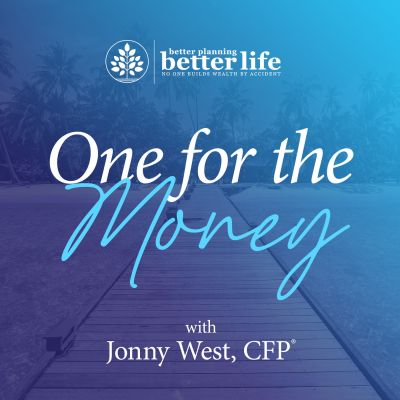Listen to hear Jonny break down the tips, tricks, and strategies he uses to help clients retire early. This is the "easy button" when it comes to early retirement because everything you want and need to know is right here. Jonny will lay it all out in plain English so you can get the details on the actions you can do to put yourself on the best path to early retirement. He'll also interview top real estate, tax, and estate planning and other professionals to provide a comprehensive approach to your retirement planning. Nobody builds wealth by accident. Listen to find out how you can do it on purpose.
https://one-for-the-money.captivate.fm
episode 25: The Fed is Not Your Friend, Unless You Are a Bank
While an early retirement can be a result of actions you have taken via better planning, there are outside forces that need to be considered as well. One of those forces is the Federal Reserve. In this episode of the One for the Money podcast, I share why the Fed is not necessarily your friend unless you are a bank. Listen until the end to hear more strategies to consider, given the actions of the Fed.
In this episode...- Why are stocks and bonds struggling? [01:46]
- Mortgage on a house of cards [04:38]
- Fixing inflation [06:41]
- No one knows the future [09:33]
A happy medium
At the halfway point of this year, the markets had the worst six-month performance in over 50 years. Stocks and bonds were down for only the fourth time since 1926. Now, nine months into the year, bonds and stocks are still down, and the primary reason they're still struggling is higher-than-expected inflation. If the prices of things that both businesses and individuals buy increase too quickly for too long, future prices can go out of control and cause significant economic problems. A small amount of inflation is good, lots of inflation is bad, and negative inflation on a broad scale is even worse, like what is seen in a depression.
Because inflation is a natural result of the economy, we want a happy medium for inflation. The Federal Reserve is responsible for keeping inflation in that comfortable, medium zone. Right now, they're taking actions that are causing both bonds and stock prices to reduce. However, it's unknown whether these actions will have their intended effect.
Understanding how we got hereTo understand where the economy is going, we must first understand the journey to where it is today. What may surprise many is that the challenges we face today result from actions taken during the Great Recession between 2008 and 2012. In the early 2000s, the housing market was ascendant, and there was a surge in home purchases and prices. Sadly, the housing market crashed, and the economy was pushed to the brink of collapse, as many banks were at risk of failing. As a result, the nation became dangerously close to another depression.
During this crisis, an untested solution was implemented to save the banks and economy that sowed the seeds of what we are reaping today. Many believe this crisis was solely a result of greedy banks, but that's not entirely true. Banks were indeed guilty, but they had a tremendous amount of help from homebuyers and a well-intentioned government program. That government program reduced the financial requirements to borrow money to purchase a home. Requirements for proof of income, credit scores, and down payments were significantly reduced or eliminated so that more people could buy homes.
Correcting inflationDuring normal times, the Federal Reserve raises interest rates and reduces the amount of money in the banks. The reduced bank reserves and higher interest rates make borrowing money more expensive for consumers, lowering demand and ultimately slowing inflation. Unfortunately, the usual levers aren't an option as the banks have already lent out much of this extra money. The Fed can now only increase interest rates and not substantially reduce the money supply in the economy.
Some may use this situation as an argument for the government to take over the banks. This solution could cause even more problems, however. Concentrating control in the hands of fewer individuals will only create more problems. The best societies and economies have power distributed more broadly. So what can we do? One solution is to significantly reduce the Fed's ability to create more money and create conditions in the economy that will allow businesses and the private sector to grow and make the extra revenue needed to retire the debt used to justify the printing of the extra money.
Resources & People Mentioned- NINJA Loan
- Will Higher Interest Rates Tame Inflation?
- Refocusing the Fed
- When Life Gives You Lemons, STAY INVESTED!, Ep #18
Connect with Jonny West
- https://BetterPlanningBetterLife.com
- Connect with Jonny on LinkedIn
Subscribe to ONE FOR THE MONEY on
Apple Podcasts, Spotify, Google Podcasts
Audio Production and Show notes by
PODCAST FAST TRACK
